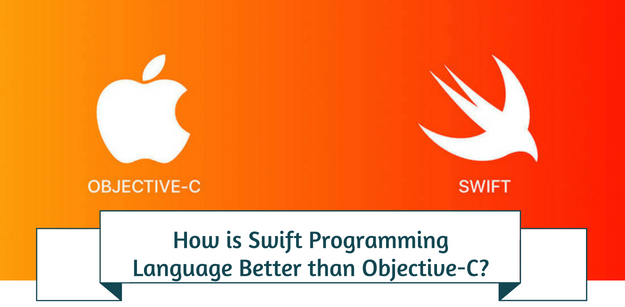Changes are inevitable in every field of technology and the same rule goes with the programming languages too. If you are playing any role associated with the development of mobile phone applications and hasn’t come across the term ‘Swift Programming’ than start taking notes here. Till now, Objective-C was the programming language used for developing iOS applications, which is a superset of C language. But Apple introduced a new programming language in 2014 called ‘Swift Programming’ which can also be described as ‘Objective-C without C’. And it has the potential to create responsive and dynamic applications for consumers in the coming years.


How is Swift Programming Better?
Apple made consistent efforts in improvising Objective-C language for developing iOS apps and presented a new coding language altogether as ‘Swift Programming’. So, let’s talk about the amazing features it has to present in the field of iOS application development:
1. Clarity of Code:
Swift Programming offers good clarity of code because of its clean syntax which is easier to read and write. Swift has removed the need for using ‘@’ symbols in every Objective-C type keyword. You no longer need to put semicolons at the end of the line or parenthesis at the surrounding conditional expressions inside if/else statements. Several other changes made to result in a clean, more expressive programming language that resembles natural English. This makes it easier for developers from a Java, Python, C# or other related backgrounds to switch to Swift Programming.
2. Less Code:
Swift based apps drop a number of repetitive statements as compared to Objective-C. For such apps, string manipulation can also be implemented with less code. Besides, Objective-C creates a lengthy code when strings are required to be joined. While in case of Swift, one just needs to add a ‘+’ sign to join two strings and this reduces the code length to a greater extent. Additionally, Swift also provides inline support for manipulating text strings and data. Apart from this, other issues like messed up orders and wrong string tokens in Objective-C resulted in app crashes. But Swift based apps are more easy to handle.
3. Safer Platform:
In case of Objective-C, call a method having nil pointer variable and it could lead to app working improperly. But with Swift programming, the compiler error is generated whenever the programmer makes the above-mentioned mistake which can be corrected at an earlier stage. Thus, Swift based apps have very fewer chances of crashes. As a result of this feature, Swift works better when it comes to bug testing compared to Objective-C. Swift avoids bad code which ultimately reduces mistakes and all of these make it a safe and secure programming language.
4. Dynamic Swift Libraries:
One of the greatest advantages Swift has to offer is its adaptability to dynamic libraries. Dynamic libraries are the pieces of code, connected directly to an app. Whenever there are some major updates like a newer version of iOS has been introduced, the dynamic libraries help to make applications up-to-date. As these libraries are directly connected to apps so that the initial size of the application is reduced to half. With this, iOS Swift libraries allow improvements that are much easier than ever.
5. Enhanced Speed:
Swift provides an advantage of improved speed during programming. Till now, C++ considers as the fastest algorithm for calculation of arithmetic. Apple has made Swift with performance speed that is equivalent to that of C++. Swift can run the app logic at a speed much greater compared to Objective-C.
6. Less Maintenance:
Swift is not dependent over C, unlike Objective-C which requires a dependency on C. This means that Swift based apps are much easier to handle. For example, in Objective-C one needs to create two files namely (.h) for the header and (.m) for implementation. Apart from that Swift requires only one file (.swift) need to create. This allows programmers to focus on core app logic with new features without the need to worry about maintenance.
7. Open Source:
Apple has declared Swift as an open source programming language in 2015. This means the language will get feedback from the community of independent developers. This creates a room for improvement in the existing language on a consistent basis.
Future of Swift Programming:
If you are developing your next iOS application and you haven’t considered using Swift programming, then give it a thought, one must also take into account the requirements of a new mobile project. Creating a mobile app in a completely different language can be tough if you are familiar with Objective-C. In that case, one must consult an organization or firm having experienced Swift developers with them. Swift is definitely coming out as a leading programming language for engaging, user-friendly mobile apps.


